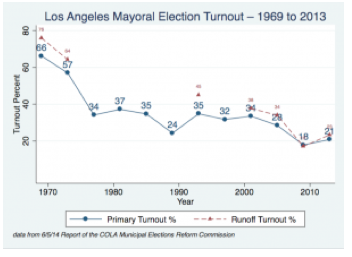MAKING POINTS-I think some of those who moan loudest about the dissolution of the city’s and the country’s social fabric are themselves most complicit in its flimsiness.
At a recent neighborhood potluck frequented by a lot of white-haired, old-time southern Californians there was an awful lot of grousing about the state of families and children today, the lack of discipline among the children or from the parents toward them. The absence of discipline permissible in classrooms and the coddling of students, whether in acquiescing to parents or refraining from applying adequate expectations and rrrrigor.
What on earth does all this mean? This is the generation that ushered in Proposition 13, which starved the public commons and any services associated with it: police, parks, streets, schools. We are to be an ever-urbanized society with increasingly less to spend generally on our over-stuffed cities. Money for private expenditures is un-censured and private sequestration of all of it is fetishized.
These hundreds turnout for a potluck common klatsch whereas those who turnout to elect those who convened the event are fewer than this in number. Free food is fair game but free elections are expendable. Swapping food in kind is worthwhile but sharing one’s labor, or purse, in service of a common good is an entirely different matter.
Whatever has happened since the social upheaval of the 60′s and 70′s culminating in the Proposition 13 lockdown of public monies? While some point to chaos in the classrooms as auguring poorly for the future, I wonder whether political isolationism is not more iconic of the disenfranchised we see everywhere, on street-corners, in privation among our public district classrooms, in a population unwilling to elect political representatives?
 To reach out and build common ground takes work. It takes work to elect political representatives; the populace must turnout for elections (since 1969 2/3 of the voting public has evaporated, according to a June 5, 1914 Report of the COLA Municipal Elections Reform Commission.
To reach out and build common ground takes work. It takes work to elect political representatives; the populace must turnout for elections (since 1969 2/3 of the voting public has evaporated, according to a June 5, 1914 Report of the COLA Municipal Elections Reform Commission.
It takes work to learn the unknown; students must exert effort in their studies (mesmerizing electronics engage attention while bypassing the task of internalizing information, an M.O. of debatable purpose). It takes work to maintain an efficient social order; money is the currency of shared resources.
Without claiming any clairvoyance regarding the relative structure of families today compared with yesterday, it seems clear that the relationship of society itself, toward itself, has changed.
Benevolence is disappearing while the pool of responsibility has shrunk in size. I consider an incident where an extracurricular group charged its members to participate in a potluck as emblematic of the shrinking responsibility toward the group. Quantitative, measurable capital transactions substitute for the messiness of emotional connection, even while these do not succeed in serving our best interest.
The result is a society with few teachers, with disenfranchised voters and citizens, and with scarce true potlucks.
Seize the opportunity to interact genuinely as a community, before both vanish altogether. Elections, neighborhood get-togethers, public district schools – these are all components of democracy, simultaneously sustained and defined by our very own work: the effort we weave into the fabric of the group. Before denouncing the collective, consider the individual’s part in its integrity.
(Sara Roos is a politically active resident of Mar Vista, a biostatistician, the parent of two teenaged LAUSD students and a CityWatch contributor, who blogs at redqueeninla.com)
-cw
CityWatch
Vol 12 Issue 51
Pub: June 24, 2014




